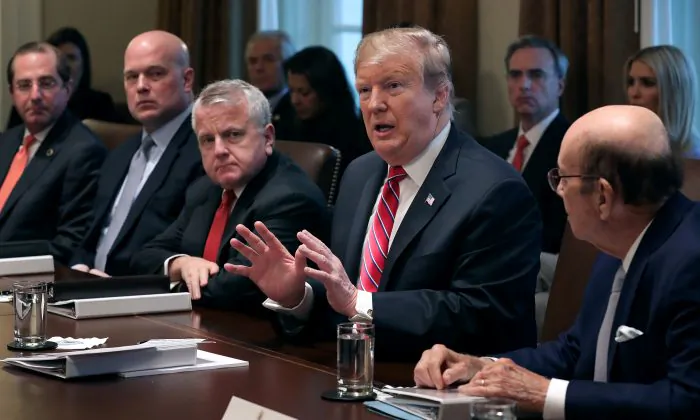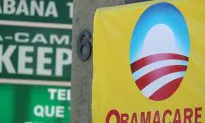President Donald Trump said Republican health care reform will only come after the 2020 election when, the president assumed, the GOP will retake the House of Representatives and have enough votes to pass a replacement of the Affordable Care Act, also called Obamacare.
“Everybody agrees that ObamaCare doesn’t work. Premiums & deductibles are far too high—Really bad HealthCare!” Trump said in a series of tweets on April 1. “Even the Dems want to replace it, but with Medicare for all, which would cause 180 million Americans to lose their beloved private health insurance.”
Everybody agrees that ObamaCare doesn’t work. Premiums & deductibles are far too high – Really bad HealthCare! Even the Dems want to replace it, but with Medicare for all, which would cause 180 million Americans to lose their beloved private health insurance. The Republicans…..
— Donald J. Trump (@realDonaldTrump) April 2, 2019
He went on to say that “the Republicans are developing a really great HealthCare Plan with far lower premiums (cost) & deductibles than ObamaCare.”
“In other words it will be far less expensive & much more usable than ObamaCare,” he said. “Vote will be taken right after the Election when Republicans hold the Senate & win back the House.”
….are developing a really great HealthCare Plan with far lower premiums (cost) & deductibles than ObamaCare. In other words it will be far less expensive & much more usable than ObamaCare. Vote will be taken right after the Election when Republicans hold the Senate & win……
— Donald J. Trump (@realDonaldTrump) April 2, 2019
Both parties generally agree that health care has gotten too expensive. Moreover, national health spending will grow at 5.5 percent a year on average from 2018 to 2027, the Centers for Medicare and Medicaid Services estimated in a February study.
Each party offers a different way to bring the prices down.
Government Control
A significant portion of Democratic lawmakers, including all leading presidential candidates, support “Medicare for All” or a single-payer, government-run health care.
Expanding Medicare to cover all Americans would cost an estimated $32 trillion over 10 years and would require substantial tax hikes.
Less Regulation Vs. Pre-existing Conditions
Trump would like to do the opposite—reduce government regulation to increase competition in the market.
“He wants the people that are receiving the care to get to make decisions about it,” White House press secretary Sarah Sanders told Fox News on April 2.
Trump has insisted, however, the plan must include protections for patients with pre-existing conditions—the most popular part of Obamacare.
“Republicans will always support Pre-Existing Conditions,” he said. “The Republican Party will be known as the Party of Great HealtCare [sic].”
….back the House. It will be truly great HealthCare that will work for America. Also, Republicans will always support Pre-Existing Conditions. The Republican Party will be known as the Party of Great HealtCare. Meantime, the USA is doing better than ever & is respected again!
— Donald J. Trump (@realDonaldTrump) April 2, 2019
Such protections would require government intervention, such as subsidized insurance for several million people with pre-existing conditions who could neither get insured through their employers, nor afford premiums on the individual market.
GOP Senate Team
Trump said on March 28 that he asked Sens. John Barroso (R-Wyo.), Bill Cassidy (R-La.), Rick Scott (R-Fla.), and some others to put together a health care plan to replace Obamacare.
The lawmakers are to “come up with something that’s really spectacular, maybe will even get support in the House from Democrats,” he said.
Trump, however, doesn’t appear to have much hope in brokering a deal with the Democrats.
“He’d love to be able to address it now, but we know that Democrats are controlled by the far, radical left wing of their party and they are a total contrast to what we need and what the president wants to see happen when it comes to health care,” Sanders said.
In the absence of legislative action, the administration plans to tweak the health care system within the power of the executive branch, Sanders said.
Trump has already put pressure on drug companies to reduce prices. The prescription drug price index has dropped by nearly a percent from January to February, the largest decrease ever in the seasonally adjusted data reaching back to 1969. Compared to February 2018, the index is down almost 1.2 percent, the largest drop since 1972.
Obamacare in Legal Jeopardy
In a March 25 federal court filing, the Justice Department sided with a federal judge in Texas who ruled Obamacare unconstitutional. The case is expected to reach the Supreme Court, and if the law is indeed struck down, it would significantly deregulate the individual insurance market and withdraw a slew of taxes and subsidies. Such a scenario would likely escalate the pressure on Congress to enact some form of health care reform.









